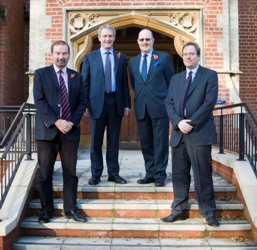Northern Ireland minister attends Centre for Strategic Studies seminar
Release Date 11 November 2011

The Secretary of State for Northern Ireland visited the University of Reading on November 9 to hear a frank assessment of the British Army's strategic successes and failures during the Troubles.
The Rt Hon Owen Paterson MP attended a seminar organised by the Centre for Strategic Studies, part of the School of Politics, Economics and International Relations.
The seminar, part of a series of events under the title: ‘British Military Campaigns Since 1969: An Audit of Performance', was chaired by Reading's Professor Colin Gray, and sponsored by the General Dynamics Research Foundation.
This first seminar in the series, held at Park House at the University's Whiteknights Campus, was given by the former General Officer Commanding in Northern Ireland, General Sir Rupert Smith, whose topic was 'Military Operations and the Good Friday Agreement'.
Sir Rupert was responsible for the British military operations in Northern Ireland from 1996 to 1998, the year the historic Good Friday peace accord was signed, and when a Real IRA car bomb in Omagh killed 29 people.
Professor Geoffrey Warner, formerly Fellow of Modern History, Brasenose College, Oxford then addressed the topic: 'Belfast: A City in Revolt'.
Sir Rupert stressed that throughout his time in command in Northern Ireland the role of British forces was to act in support of the Royal Ulster Constabulary, and to conduct operations within the rule of law.
Summing up the British Army's role in Northern Ireland over nearly 30 years, he listed a number of things that the organisation could be proud of, as an audit of its performance.
However he stressed that there some of the strategic principles developed during this period that could not be transplanted to other parts of the world, such as Iraq and Afghanistan, without taking into account radically different contexts.
Professor Warner spoke extensively about the role played by General Sir Ian Freeland, head of the Army in Northern Ireland when the Troubles first started in 1968.
He gave a number of candid insights, based on Sir Ian's recently released private papers, of the complex challenges he faced, chronicling the desire of paramilitary organisations on both sides to deliberately bring about confrontation with the British Army on the streets of Belfast in this period.
The seminar series intends to conduct an audit of five British military campaigns since 1969. Next year seminars will focus on British involvement during the conflict in the Falklands, the Balkans and the first Gulf War.
The aim of the series is to bring together a mixture of former operational commanders and academics to present papers who will address a number of key issues about each campaign.
Dr Geoff Sloan, who organises the seminars, said: "The first seminar of the series was particularly pleasing on two counts. First, the diverse audience ensured a healthy debate between practitioners and a former operational commander. Secondly, having the Secretary of State for Northern Ireland participating in the seminar underlined the openness and frank approach of Owen Paterson to understanding the past as a guide to the future.
"The presence of the Secretary of State in the audience underlined his desire to understand the long and complex history of the British Army's involvement in maintaining peace and the rule of law in Northern Ireland.
"It also demonstrates that in the field of Strategic Studies, Reading University can mount seminars of real quality."
Ends
For more details, or to organise interviews with Dr Geoff Sloan, expert in geopolitics and 20th century Anglo-Irish relations, please contact Pete Castle at the University of Reading press office on 0118 378 7391 or email p.castle@reading.ac.uk.
Notes to editors:
University of Reading
The University of Reading was established in 1892 and received its Royal Charter in 1926.
The University is one of the select group of research-intensive universities that make up the 1994 Group of high-quality academic institutions and takes pride in a combination of established history and cutting-edge research. The University delivers a world-class student experience, research-led teaching and has an international reputation of the highest quality.
The University is regularly ranked among the top 200 universities in the world (164th - THE World University Rankings 2011).
87% of the University's research was classified as of international standing in the Research Assessment Exercise (RAE) 2008.
The University has invested almost 400 million in its campuses in the last eight years and has some of the best teaching, research and student accommodation facilities in the country.
The latest graduate destinations survey (2010) resulted in the University's best outcome for a decade with graduate employability.
The University is consistently in the top quartile for the quality of the student experience (89% student satisfaction rating in National Student Survey 2011).
In 2008 Henley Management College became part of the University to form the Henley Business School at the University of Reading, now offering world class teaching and research in management, finance and property.
Centre for Strategic Studies
The Centre for Strategic Studies is the focus for research, and discussion on the broad subjects of international and national security, war and peace, and strategy, in the School of Politics and International Relations. Members of the Centre are active participants in scholarly as well as public policy debate on the vital security issues of the day.
